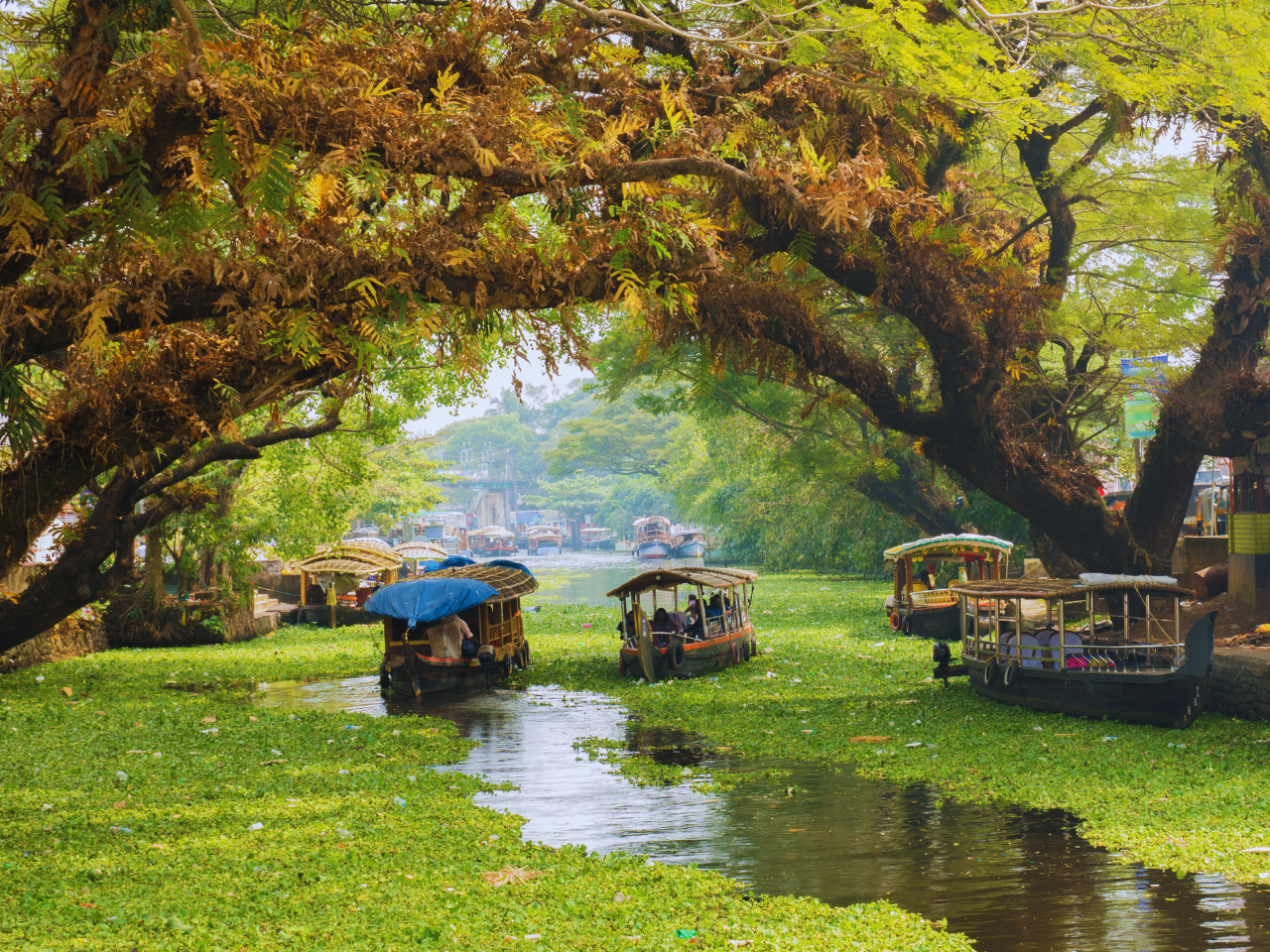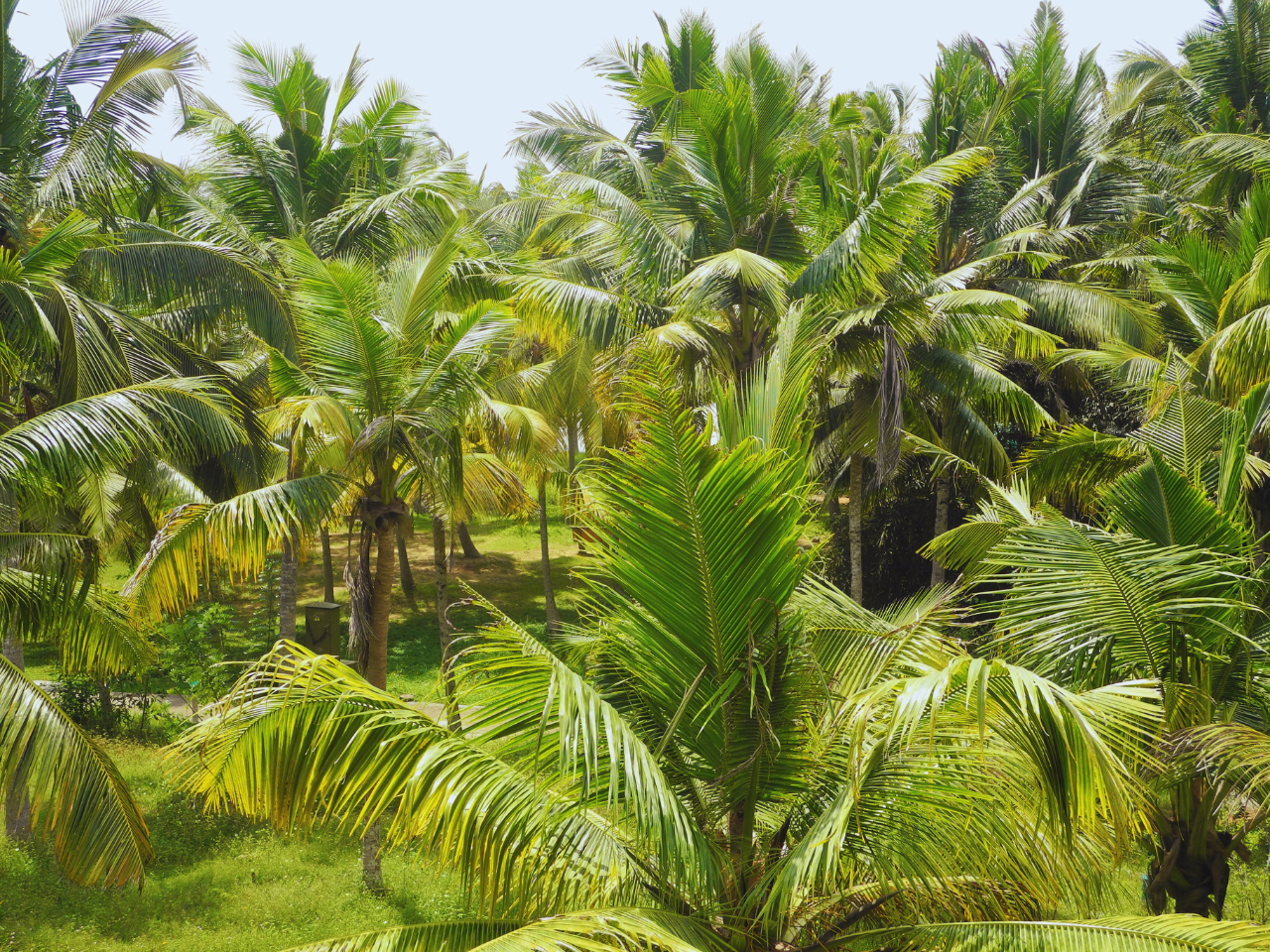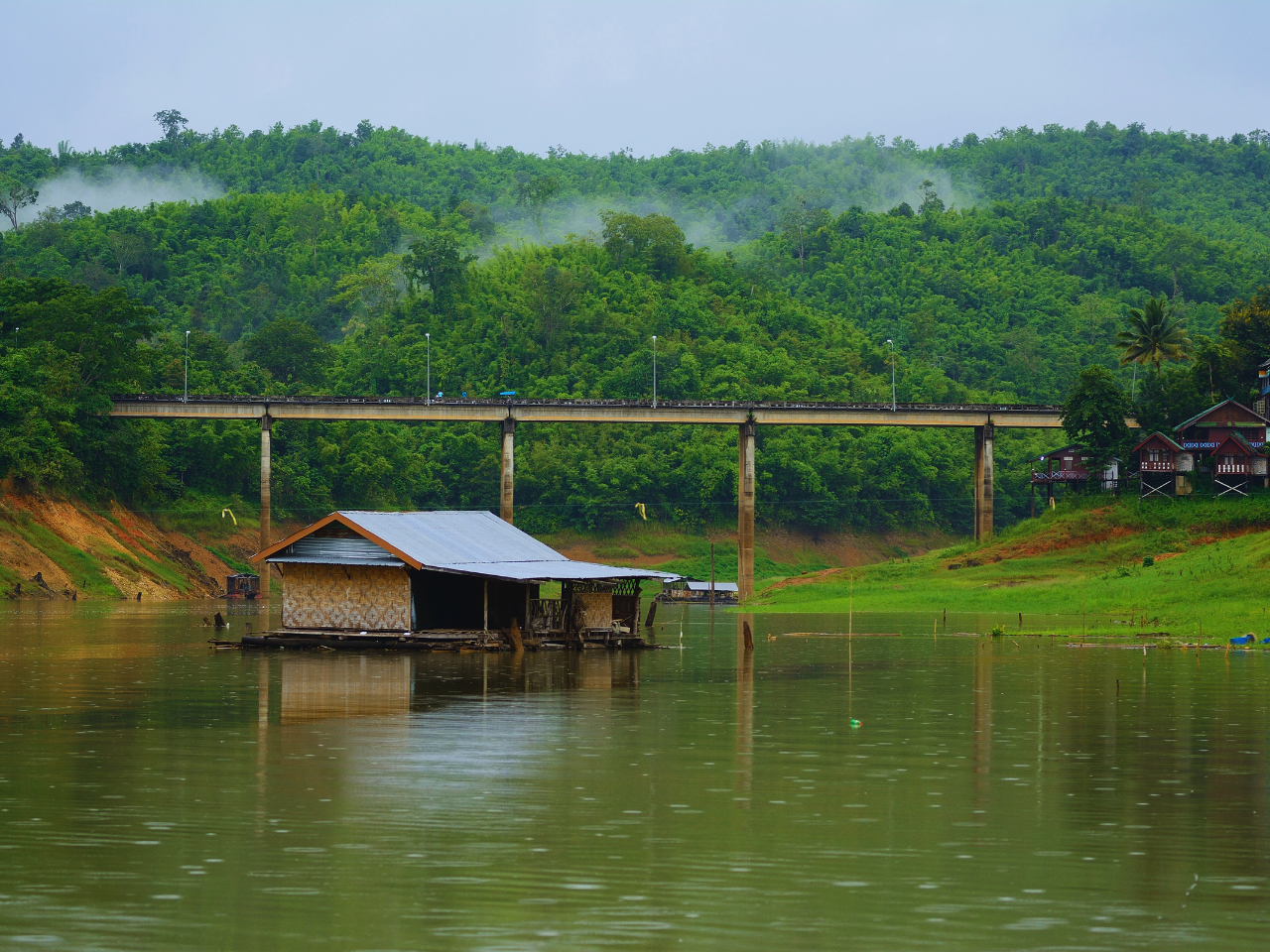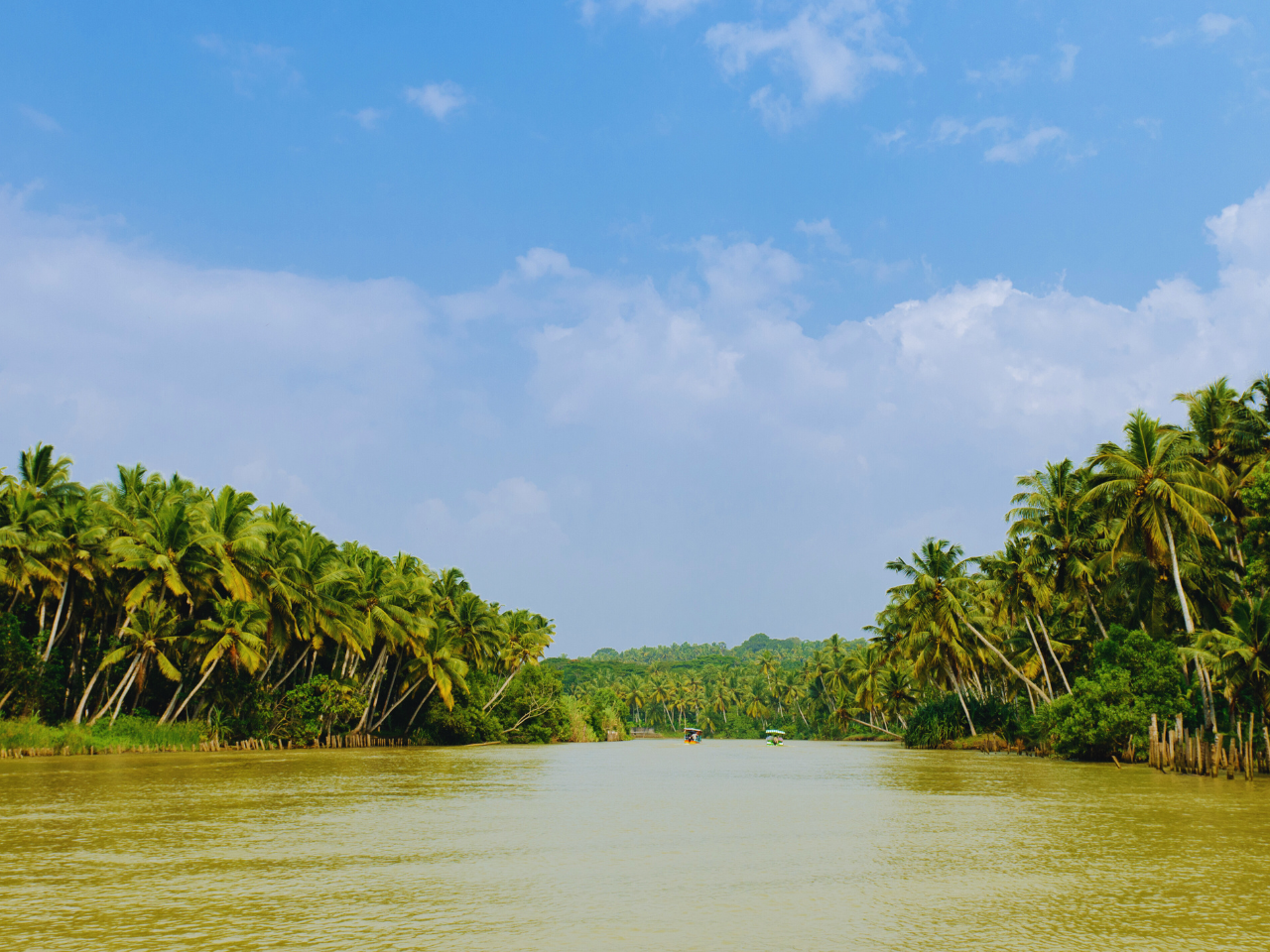Kerala
Kerala – The Enchanting God’s Own Country
Kerala, often referred to as “God’s Own Country,” is a tropical paradise located in the southern part of India. Nestled between the Arabian Sea and the Western Ghats, Kerala is renowned for its serene backwaters, lush greenery, and rich cultural heritage.
Kerala’s backwaters, with their tranquil network of lakes, rivers, and canals, are world-famous. The traditional houseboats, known as kettuvallams, offer a unique way to explore these waters while enjoying the scenic beauty of palm-fringed shores and vibrant villages.
Beyond its natural beauty, Kerala is a cultural melting pot, with influences from Dravidian, Arab, and European civilizations. The state’s vibrant festivals, classical dance forms like Kathakali, and traditional Ayurvedic practices are a testament to its rich cultural tapestry.
Nature enthusiasts are drawn to Kerala for its diverse landscapes, ranging from pristine beaches to verdant hills and wildlife sanctuaries. The Western Ghats, a UNESCO World Heritage Site, are home to unique flora and fauna, making Kerala a haven for biodiversity.
Best Time To Visit Kerala
Winter (October to February):
- Ideal for exploring: This season offers pleasant weather, making it the best time for sightseeing, houseboat cruises, and beach activities.
- Weather: Temperatures range from 17°C to 30°C, making it comfortable for outdoor activities.
Monsoon (June to September):
- Experience the magic of the monsoon: Kerala’s monsoon is known for its rejuvenating rain showers, which bring the landscape to life with lush greenery.
- Weather: Heavy rainfall and temperatures ranging from 19°C to 30°C. This is also the best time for Ayurvedic treatments.
Summer (March to May):
- Perfect for hill stations: While the coastal areas can be hot and humid, the hill stations of Kerala offer a cool respite.
- Weather: Daytime temperatures can rise to 36°C, but in hill stations like Munnar, it remains between 20°C and 25°C.
Culture and Cuisine of Kerala
Culture: Kerala’s culture is a vibrant blend of traditions from Dravidian, Arab, and European influences. The people of Kerala, known as Keralites or Malayalis, are renowned for their hospitality and cultural pride.
Art and Craft: Explore Kerala’s traditional crafts, including handloom textiles, coir products, and intricate wood carvings. The state is also famous for its mural paintings and metalwork.
Music and Dance: Kerala is home to classical dance forms like Kathakali, Mohiniyattam, and Theyyam, which narrate stories through expressive movements and elaborate costumes. Traditional music includes the soothing rhythms of Carnatic music and the energetic beats of chenda (drum) performances.
Festivals: Kerala celebrates numerous festivals that reflect its rich cultural heritage. Onam, the harvest festival, is celebrated with elaborate feasts, traditional dances, and boat races. Vishu, Thrissur Pooram, and Attukal Pongala are other major festivals that showcase the state’s vibrant traditions.
Cuisine: Kerala’s cuisine is a delectable fusion of flavors, known for its use of coconut, spices, and fresh seafood. Must-try dishes include appam with stew, puttu with kadala curry, and Kerala sadya, a traditional vegetarian feast served on a banana leaf. Don’t miss out on trying the world-renowned Kerala fish curry and sipping on toddy, a local palm wine.
Top Destinations to Explore in Kerala
Alleppey (Alappuzha): Known as the “Venice of the East,” Alleppey is famous for its backwaters and houseboat cruises. The serene network of canals, lagoons, and lakes is perfect for a relaxing retreat.
Munnar: This picturesque hill station is renowned for its tea gardens, mist-covered hills, and cool climate. Explore the Eravikulam National Park, visit the Tea Museum, and take in the breathtaking views from Top Station.
Kumarakom: Situated on the banks of Vembanad Lake, Kumarakom is a haven for birdwatchers. The Kumarakom Bird Sanctuary attracts a variety of migratory birds, and the tranquil backwaters offer a peaceful escape.
Kochi (Cochin): Kochi is a vibrant port city with a rich history influenced by Portuguese, Dutch, and British colonizers. Explore the historic Fort Kochi area, visit the Jewish Synagogue, and stroll along the picturesque Chinese fishing nets.
Wayanad: A lush district nestled in the Western Ghats, Wayanad is known for its wildlife sanctuaries, waterfalls, and caves. The Edakkal Caves with their ancient petroglyphs, and the scenic Banasura Sagar Dam are must-visit spots.
Thekkady: Home to the Periyar Wildlife Sanctuary, Thekkady is a prime destination for wildlife enthusiasts. Enjoy a boat ride on Periyar Lake to spot elephants, tigers, and various bird species.
Varkala: This coastal town is famous for its dramatic cliffs, pristine beaches, and the 2,000-year-old Janardanaswamy Temple. Varkala is a great place to relax and enjoy Ayurvedic treatments.
Thrissur: Known as the cultural capital of Kerala, Thrissur hosts the grand festival of Thrissur Pooram, which features a spectacular display of caparisoned elephants, fireworks, and traditional percussion music.
Bekal: Bekal is known for the massive Bekal Fort, which offers panoramic views of the Arabian Sea. The fort’s scenic surroundings and beaches make it a perfect spot for history buffs and nature lovers alike.
Athirapally: Dubbed the “Niagara of India,” Athirapally Waterfalls is the largest waterfall in Kerala. The nearby Vazhachal Falls and the lush Sholayar Forests make this area a popular spot for nature enthusiasts.
Adventure Activities in Kerala
Trekking: Kerala offers numerous trekking trails through its diverse landscapes. Popular treks include the Anamudi Peak Trek in Munnar, Agasthyakoodam Trek in the Western Ghats, and the Chembra Peak Trek in Wayanad.
Houseboat Cruises: Experience the backwaters of Kerala on a traditional houseboat. The cruise takes you through serene waterways, offering glimpses of village life, lush paddy fields, and coconut groves.
Wildlife Safari: Explore Kerala’s rich biodiversity with a wildlife safari in Periyar Wildlife Sanctuary, Wayanad Wildlife Sanctuary, or Silent Valley National Park. Spot elephants, tigers, and a variety of bird species.
Paragliding: Soar above the hills of Vagamon, one of Kerala’s top paragliding spots. Enjoy the breathtaking views of the lush landscape and the thrill of flying.
Kayaking: Explore the backwaters up close by kayaking through narrow canals and tranquil lakes. Kumarakom and Alleppey offer great opportunities for this peaceful adventure.
Snorkeling and Scuba Diving: The beaches of Kovalam and Varkala offer snorkeling and scuba diving opportunities, where you can explore the vibrant marine life and coral reefs.
Rock Climbing: The Western Ghats provide excellent spots for rock climbing, especially around Munnar and Wayanad, offering challenges for both beginners and experienced climbers.
Cycling: Kerala’s scenic routes are perfect for cycling enthusiasts. Explore the countryside, tea plantations, and coastal roads while enjoying the fresh air and stunning views.
Ayurveda Retreats: Kerala is the birthplace of Ayurveda. Many resorts and wellness centers offer traditional Ayurvedic treatments, yoga, and meditation, making it a great place to rejuvenate the mind and body.
Boat Races: Experience the thrill of watching traditional boat races, especially during the Onam festival. The Nehru Trophy Boat Race in Alleppey is one of the most famous events.
Hidden Places and Offbeat Experiences in Kerala
Gavi: A lesser-known gem in the Periyar Tiger Reserve, Gavi offers a pristine environment for nature lovers. The area is ideal for trekking, birdwatching, and spotting wildlife.
Marayoor: Located near Munnar, Marayoor is known for its sandalwood forests and prehistoric dolmens (burial sites). The village offers a unique cultural experience with its traditional sugarcane fields and jaggery-making units.
Thenmala: Famous as India’s first planned ecotourism destination, Thenmala offers a variety of activities like trekking, mountain biking, and boating. The nearby Palaruvi Waterfalls are a must-visit.
Ponmudi: This tranquil hill station is known for its rolling hills, tea estates, and mist-covered valleys. Ponmudi offers a peaceful retreat with opportunities for trekking and exploring the surrounding forests.
Kollam: Kollam is a picturesque town known for its Ashtamudi Lake and historic landmarks like the Thangassery Lighthouse. The Munroe Island near Kollam is a hidden gem for backwater cruises and village tours.
Vagamon: An offbeat hill station, Vagamon is known for its meadows, pine forests, and adventure activities. The area is perfect for trekking, paragliding, and rock climbing.
Nelliampathy: Known as the “Poor Man’s Ooty,” Nelliampathy is a hill station with lush coffee and tea plantations. The area offers stunning viewpoints, waterfalls, and trekking opportunities.
Palakkad: This district is known for its verdant landscapes, including the Silent Valley National Park and the Palakkad Fort.
Palakkad offers a mix of natural beauty and historical significance, with attractions like the Malampuzha Dam and Gardens, where you can enjoy a relaxing boat ride or explore the expansive gardens.
Vythiri: A lesser-known hill station in Wayanad, Vythiri is famous for its lush forests, misty hills, and coffee plantations. The area is ideal for nature walks, birdwatching, and staying in treehouses that offer a unique jungle experience.
Kuttanad: Known as the “Rice Bowl of Kerala,” Kuttanad is one of the few places in the world where farming is done below sea level. This region is a fascinating destination to explore Kerala’s agricultural heritage, with its vast paddy fields and intricate system of canals.
Idukki: A tranquil district in Kerala, Idukki is known for its dense forests, wildlife sanctuaries, and the massive Idukki Arch Dam. The hill station of Painavu and the scenic beauty of the Idukki Reservoir are major attractions in the region.
Kasaragod: Located in the northern part of Kerala, Kasaragod is known for its historical forts, serene beaches, and the unique Theyyam ritual art form. The Bekal Fort, Chandragiri Fort, and the picturesque Valiyaparamba backwaters are highlights of this offbeat destination.
Travel Tips for Kerala
- Pack for the Weather: Depending on the season, pack lightweight cotton clothes for the humid climate or warmer layers for the hill stations. Don’t forget an umbrella or raincoat during the monsoon.
- Respect Local Traditions: Kerala is known for its rich cultural heritage, so dress modestly when visiting temples and other religious sites. It’s also advisable to remove footwear before entering temples.
- Stay Hydrated: The tropical climate can be humid, so carry a water bottle and stay hydrated, especially when exploring outdoor attractions.
- Try Local Cuisine: Don’t miss out on Kerala’s delicious cuisine. Whether it’s the traditional sadya or fresh seafood, indulge in the local flavors. Remember to specify the spice level if you’re not accustomed to spicy food.
- Opt for Eco-friendly Tourism: Kerala is an eco-conscious state, so opt for eco-friendly accommodations and activities. Avoid using plastic and support local communities by purchasing souvenirs from local artisans.
- Book in Advance During Peak Season: Kerala is a popular tourist destination, especially during the winter months. To avoid last-minute hassles, book your accommodations, houseboat cruises, and other activities in advance.
- Experience Ayurveda: Kerala is the birthplace of Ayurveda, so take the opportunity to indulge in traditional Ayurvedic treatments, massages, and wellness retreats.
- Explore Beyond the Usual: While the popular destinations are worth visiting, try to explore some of Kerala’s offbeat places for a more unique and intimate experience with nature and local culture.
- Safety First: Kerala is generally safe for tourists, but it’s always wise to stay alert, especially in crowded places. Keep your belongings secure, follow local advice, and respect wildlife by keeping a safe distance during safaris.
- Local Transport: Kerala has a well-connected network of public transportation, including buses, taxis, and auto-rickshaws. For a more scenic experience, consider taking a train journey along the coast or through the hills.
Kerala, with its blend of natural beauty, cultural richness, and warm hospitality, offers a diverse range of experiences for every traveler. Whether you’re seeking a relaxing getaway, an adventure-filled trip, or a deep dive into traditional culture, Kerala promises to leave you with memories that last a lifetime.
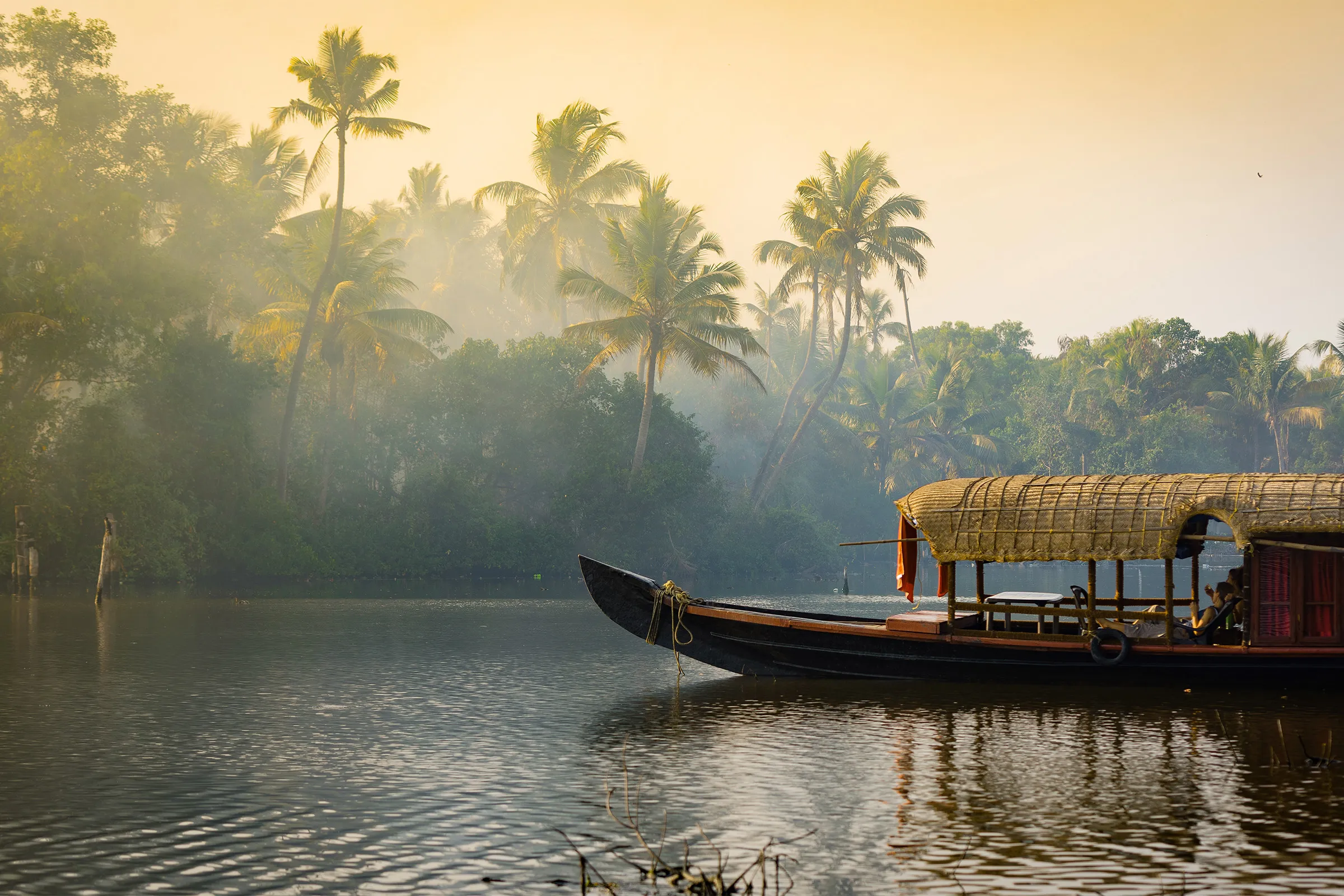
Get Your Best Tour Experience
Customer Speak
Best Seller Package Kerala
Explore More About Kerala
To reach Kerala, you have several options depending on where you’re starting from. Here’s an overview:
1. By Air
- Kerala has four main international airports: Cochin International Airport (COK) in Kochi, Trivandrum International Airport (TRV) in Thiruvananthapuram, Calicut International Airport (CCJ) in Kozhikode, and Kannur International Airport (CNN).
- Direct flights are available from major cities in India and international destinations like the Middle East, Southeast Asia, and parts of Europe.
- From the airport, you can take a taxi or bus to your final destination within Kerala.
2. By Train
- Kerala has a well-connected railway network with major train stations in Trivandrum (Thiruvananthapuram), Ernakulam (Kochi), Kozhikode (Calicut), and Kannur.
- Book tickets through IRCTC or at local railway stations. Major trains from cities like Delhi, Mumbai, Bangalore, Chennai, and Hyderabad connect to Kerala.
3. By Road
- Kerala is well connected by road with neighboring states: Karnataka and Tamil Nadu.
- You can take a long-distance bus run by KSRTC (Kerala State Road Transport Corporation) or private operators, which are frequent from Bangalore, Chennai, and other South Indian cities.
- Alternatively, you can self-drive or hire a cab for a road trip into Kerala.
4. By Sea
- Kochi has a major port, and some luxury cruises and boats stop here on certain international and domestic routes.
- You can explore options for cruises from destinations like Mumbai.
5. Local Transport within Kerala
- Once in Kerala, travel between cities is convenient via trains, state-run buses, and private taxis.
- For shorter distances, you can also consider auto-rickshaws and ride-hailing services.
If you need specific guidance based on your starting location, let me know!
The best time to visit Kerala largely depends on what you want to experience, but generally, the ideal time is from October to March. Here’s a breakdown:
October to March: This is the peak tourist season. The weather is pleasant, with cooler temperatures and low humidity, making it perfect for sightseeing, backwater tours, and beach activities.
April to June: These months are hotter and more humid, which can make outdoor activities less enjoyable. However, this is a good time to find deals on accommodations and visit less crowded places.
July to September: This is the monsoon season, with heavy rainfall. While it’s not the most popular time to visit, the lush greenery and fewer tourists can be appealing. It’s also a great time for Ayurvedic treatments, as the weather is believed to enhance the effectiveness of these therapies.
If you’re interested in specific activities like wildlife watching, festivals, or cultural experiences, those can also influence the best time for your visit.
If you are coming through Train or Flight then you need to reach By reaching Ernakulam Railway station or Cochi airport.
You want to visit then July to Junauary will be the proper time to visit Kerala. If you want to avoid high cost then don’t come in holiday dates.
You can explore Munnar Thekkady Alleppey Vagamon Varkala Kovalam Trivandrums.
To visit 5 days 4 nights is the best plan in which you can explore Alleppey Vagamon Varkala Kovalam Trivandrum.
Houseboat Experiences by Carnival Tours, Alleppey.
In companies account on the 1st day only
Depends upon the Package you have taken.
Depends upon the Package you have taken.
Yes, Kerala is generally safe at night, especially in tourist areas, but remain cautious and avoid isolated places.
God’s Own Country: Kerala is often referred to as “God’s Own Country” due to its stunning landscapes, rich culture, and natural beauty, including backwaters, hills, and beaches.
High Literacy Rate: Kerala boasts one of the highest literacy rates in India, at over 96%. This is attributed to the state’s strong focus on education and social welfare.
Unique Festivals: The state is famous for its vibrant festivals, such as Onam and Vishu, which showcase traditional music, dance, and feasting. The snake boat races during Onam are particularly popular.
Ayurveda Hub: Kerala is renowned for its Ayurvedic treatments and wellness tourism. The state has numerous Ayurveda resorts and practitioners, making it a leading destination for holistic healing.
Backwaters: The backwaters of Kerala, particularly in places like Alleppey and Kumarakom, are a network of lagoons, lakes, and canals that offer houseboat experiences and are a major tourist attraction.
Diverse Wildlife: Kerala is home to several wildlife sanctuaries and national parks, including Periyar National Park and Wayanad Wildlife Sanctuary, where visitors can see elephants, tigers, and various bird species.
Cultural Melting Pot: The state has a rich cultural heritage influenced by various religions, including Hinduism, Islam, and Christianity, reflected in its architecture, cuisine, and art forms.
Spice Capital: Historically, Kerala was a major spice trading center, earning the nickname “Spice Garden of India.” It produces a variety of spices, including black pepper, cardamom, and cinnamon.
UNESCO World Heritage Sites: The Hill Stations of Kerala, including the Western Ghats, have been designated as UNESCO World Heritage Sites for their biodiversity and unique ecosystems.
Women Empowerment: Kerala is known for its progressive gender equality and women’s empowerment initiatives, which are reflected in higher participation of women in education and the workforce compared to many other Indian states.

